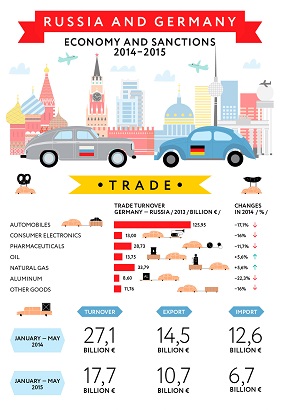On 12 October 2015, the RIAC and the Luxembourg Embassy held a seminar devoted to relations between Russia and the EU. Below, General Director in the Russian Federation of the Belgian-Luxembourg Chamber of Commerce in Russia Oleg Prozorov shares his view of the investment climate in Russia today and the work of foreign companies in our country.
On 12 October 2015, the RIAC and the Luxembourg Embassy held a seminar devoted to relations between Russia and the EU. Below, General Director in the Russian Federation of the Belgian-Luxembourg Chamber of Commerce in Russia Oleg Prozorov shares his view of the investment climate in Russia today and the work of foreign companies in our country.
How are foreign investments in Russia changing against the background of the international political crisis?
Reports say that capital is coming back into the Russian Federation.
European investments in the Russian Federation have taken a blow because EU banks (notably the EBRD) stopped financing the projects in which they previously took part. As a result, European companies had to bring their own capital into Russia. It should be recalled that banks preserve their investments in old projects because it would be unreasonable to lose the advantages they already enjoy in Russia.
As far as I know, US companies that have no auxiliary structures to facilitate investment are also still investing. One high-profile example is that, over the past two years, one of the biggest Luxembourg holding companies has built a new factory in Togliatti. Because of the fall of the rouble, using the import-substitution format, it has managed to grab about 80% of the market for its Russian output. The same is true of Belgian companies that have been operating in Russia for a long time. Belgian and Luxembourg companies have built a total of 52 plants in Russia.
What is the core business of companies that locate their production in Russia?
The priority is high technologies, i.e., chemistry and pharmaceuticals. We are also in the food industry. For example, the IvBev company has seven breweries in Russia alone. Of course, companies have had to adapt, to change the system for supply of parts that used to be brought from Europe. Because the euro has strengthened against the rouble today, they find these materials in the Pacific Rim countries and in Latin America. Both the political and economic elites have recently realised that the sanctions will be long-lasting, with still longer-lasting consequences. The emerging situation is negative but stable and there is a growing sense that one has to work with what there is. Let us hope that this kind of stability will prompt other foreign companies to enter the Russian market.
¬Would it be fair to say that the Russian investment market is appealing?
Today, virtually all the Russian regions are competing for foreign investors. They vie with one another in providing privileges, benefits and other preferences. From that point of view, the Russian climate is quite hospitable. There are, of course, problems because the new Russian tax institutions do not always do what the country’s leadership tells them: they annoy companies that have come here to produce goods on Russian territory with excessive inspections. This applies, for example, to the food sector, in which some Belgian companies are facing difficulties.
What do you read these days? And what would you advise our audience to read on business and economics?
If you take the economic sphere, I prefer the Internet these days. I don’t mind saying it, although many, for some reason, treat it as vulgar and not quite their class. I think such sites as The Financial Times, RBC, Luxembourg for business or Belgian media working in the economic field are very quick to report things. We should engage not in prophecies and theories, but in what is happening in practice. Unfortunately, I can’t recommend any new print media.




